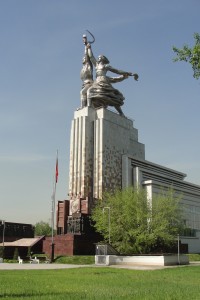(Volume 24, page 231)
SOCIALISM. (1) the first stage of the Communist formation. The economic basis of socialism is social ownership of the means of production; it’s political basis is the power of the toiling masses under the leadership of the working class, headed by the Marxist-Leninist party. Socialism is a social structure that precludes the exploitation of man by man and develops in conformity with a plan, with the objectives of improving the well-being of the people and comprehensively developing every member of society.
(2) scientific socialism, the doctrine that reveals the historical necessity for the establishment of socialism and shows the way for its gradual transformation into communism; part of the Marxist-Leninist theory.
(Volume 24, page 233)
Sociopolitical system. The socialist sociopolitical system is characterized by the establishment and development of the socialist state and by the existence of two friendly classes-the working class and the cooperative (kolkhoz) peasantry, as well as the popular intelligentsia, under the leadership of the working class and its vanguard, the Marxist-Leninist party. Under socialism, profound economic transformations result in the abolition of exploiting classes and strata. Society is entirely made up of working people, and there is a continuous increase in the proportion of the working class in the population…
The most important changes in the sociopolitical structure of socialism are associated with the development of the socialist state. The victory of the socialist revolution leads to the establishment of the dictatorship of the proletariat, a necessary condition for the construction of socialism. The dictatorship of the proletariat strives to suppress and abolish the exploiting classes. But its chief goals are the organization of socialist construction, the creation of a socialist society, and ensuring the complete, final victory of socialism. The exploiting classes in the cities and the countryside are abolished during the period of transition from capitalism to socialism. With the strengthening of socialist economic forms and the sociopolitical alliance of the working class, the cooperative (kolkhoz) peasantry, and the intelligentsia, the dictatorship of the proletariat exhausts its functions in the country’s domestic affairs, and the proletarian state gradually becomes the socialist state of all the people. This process is completed with the transition to the stage of developed socialism.
In all socialist countries the state, as the political organization of the alliance between the working class and the peasantry, has the same character and functions. However, the socialist state (the dictatorship of the proletariat) may assume various forms, depending on historical conditions, the specific correlation of class forces in a particular country, and national traditions. Forms of popular representation, as well as the forms of state organization, may vary. (For example, a federative structure is characteristic of a number of countries.) Within a system of political forces there may be a one-party system or a multiparty system based on a United popular front. The form of government in the Soviet Union is the Soviets of People’s Deputies, and in the majority of other socialist countries, the People’s democracy.
In the sociopolitical system of socialism the working class plays a leading role assigned to it not merely on the basis of numerical significance, which varies, depending on the level of economic development and the pace of the scientific and technological revolution. The working class has always been the main productive force in society. It’s revolutionary character, discipline, organization, and collectivism have determined its leadership position in the system of socialist social relations. The foundation for the political structure of socialist society is the alliance of the working class and the cooperative (kolkhoz) peasantry.
The growth of productive forces and agriculture, the rising cultural level in the countryside, and the reorganization of the village way of life result in changes in the social makeup and psychology of the peasantry, which exhibits more and more traits in common with those of the working class. Under socialism, the intelligentsia grows rapidly, owing to a continuous influx of members of the working class and peasantry. The socialist intelligentsia is a social stratum which, by virtue of its social character, constitutes an integral part of socialist society. The consistent obliteration of the differences between the working class, the peasantry, and the intelligentsia is an objective, law like regularity of the development of socialism.
An important role in the sociopolitical life of socialist society is played by the principle of the equal rights of nations and nationalities, and their constant rapprochement, based on a common economic life, the mutual enrichment of cultures, the strengthening of a single Marxist-Leninist ideology, and the consistent application of the Leninist national policy. Political equality between nations is guaranteed, and the remnants of economic and cultural inequality inherited from the previous regime are completely eliminated (see NATIONAL QUESTION). During the period of socialist construction and the Soviet Union a new historical community, the Soviet people, took shape, and new, harmonious relations develop between classes and social groups and between nations and nationalities.
In socialist society, democratic principles constitute the foundation for the development of political structures. Socialist democracy includes political freedoms, such as freedom of speech, freedom of the press, freedom of assembly, and the freedom to elect plenipotentiary representatives and to be elected to such positions. Among the social rights ensured by socialist democracy are the right to work, vacations, free education and medical services, old-age pensions, and sickness and disability pensions. In addition, socialist democracy guarantees the equal rights of all nations and nationalities and the equal rights of men and women in all spheres of political, economic and cultural life. Socialist democracy has decisive advantages over bourgeois democracy: it not only proclaims the rights of the working people but also guarantees that these rights are realized. Socialism protects the freedom of the individual, especially freedom from exploitation.
The Marxist-Leninist party is the guiding and leading force in socialist society. Marxist-Leninist parties unite the advanced, most conscious part of the working class, the cooperative (kolkhoz) peasantry, and the intelligentsia. Moreover, the Marxist-Leninist parties direct all the productive activity of the people, and land and organized, planned, and scientific foundation to the people struggle to build socialism and communism. The party carries out its leadership role through state bodies, the trade unions, and use and other mass organizations.
Volume 20 (page 344-345)
Socialism. The political economy of socialism-part of the political economy of the commonest mode of production and general-deals with the study of the production relations of the multi sector economy of the transition period between capitalism and socialism. It discloses the laws of development of social production and inherent in the first phase of the commonest mode of production (the system of socialist production relations, the operation of economic laws, and the application of these laws and the planned management of the national economy). Moreover, the political economy of socialism investigates the specific ways in which these economic laws are manifested at a particular stage in the development of socialism. The building of a developed socialist society and the USSR-a society developing on its own bases and characterized by the high level of maturity in the material and technical basis and in the system of production relations-creates the conditions for the more thorough and consistent study and utilization of the advantages of socialism. The maturity of socialist production relations (their achievement of the highest level of development) is an important precondition for making a more profound analysis of their essence and of the forms in which they are manifested.
In the political economy of socialism the main objects of investigation are production relations under socialism and, above all, the social ownership of the means of production, which underlies socialist production relations and characterizes the mode of appropriation of material and cultural values in the interest of the toiling masses. In the USSR and other socialist countries there are two forms of socialist public property: state property and cooperative property.
The predominance of socialist public ownership, which serves as the basis for the creation of interests shared by all the people, determines the direction in which socialist production develops, and subordination to the aims of satisfying the material and cultural needs of the people more and more fully and comprehensively developing all members of society. These phenomena and goals are expressed as the fundamental economic law of socialism.
Social ownership of the means of production also creates the conditions for the rise and operation of the planned proportional development of the national economy. This law necessitates and makes possible the coordinated functioning of society, the prediction of the results of its functioning, and the planned management of social production, which includes the conscious elaboration of the goals of economic development and the means of achieving them.
The political economy of socialism studies the specific features of the ways in which the economic laws characteristic of some or all socioeconomic formations operate under socialist conditions. Among these laws are the law of economies of time, the law of increasing requirements, and the law of the more rapid growth of the production of the means of production.
Of importance in the political economy of socialism is the study of commodity-money relations and the economic laws inherent in them, including the law of value and the laws of monetary circulation. Commodity-money relations have a new, socialist content during the first phase of communist society. The socialist state uses commodity-money relations, in conformity with a plan, and all phases and stages of expanded socialist reproduction, both within the national economy and an economic relations between countries in the world socialist system. The planned utilization of the categories of commodity production is the basis for economic accounting.
The political economy of socialism studies the categories and laws characteristic of social reproduction in general and its particular spheres (production, distribution, exchange, and consumption). At the present stage of socialist construction, special attention is paid to analyzing the interconnections between subdivision I (the production of the means of production) and subdivision II (the production of consumer goods) and the relations between the extensive and intensive factors in economic growth. In addition, the emphasis is placed on analyzing the problems of increasing the efficiency of production and of the entire economy on the basis of more rapid scientific and technological progress, improving the organization of production, and improving management and planning techniques throughout the economic mechanism. The political economy of socialism elucidates the socioeconomic aspects of the modern scientific and technological revolution under socialist conditions.
The planned management of the national economy under socialism is based on the knowledge and use of a system of objective economic laws, which provide for organic unity between theory and practice and for the elaboration of a scientific foundation for the economic policies of the party and the state.
The political economy of socialism studies the system of the planned management of the socialist economy-a system that organically combines targets assigned by planning bodies with other economic levers for influencing production, including prices, credit, wages and profits. The comprehensive study of the management of social production is made possible by close cooperation among specialists in economics and other sciences, such as law and sociology.
With the establishment of socialist property, the state is transformed into a body that regulates the development of the economy in conformity with a plan. The political economy of socialism studies the economic role and function of the state and the forms and methods of socialist economic management.
The formation of the world socialist economy results in the creation of a new sphere of production relations-international socialist economic relations. The political economy of socialism has been substantially enriched by the study of international socialist economic relations and the laws characteristic of them, as well as by the study of socialist economic integration and the internationalization of production.
In addition to political economy, a highly ramified system of economic sciences has developed: Gen. economics, which covers national economic planning, the theory of economic management, and statistics; functional economics, which includes financing credit, labor economics, and price formation; and the economics of sectors, which focuses on industry, agriculture, and transportation, for example. The political economy of socialism constitutes the theoretical and methodological foundation for the entire system of economic sciences. Each economic science can only develop successfully if it is based on the theoretical conclusions and foundations of Marxist-Leninist political economy. Socialist political economy is, in turn, enriched by the factual material accumulated as the various economic sciences developed.
The practical function of the political economy of socialism is to elaborate scientific principles for economic policies and for the planned management of the national economy. As science penetrates the essence of socialist production relations and laws more deeply and reveals their operation as a system more fully, political economy achieves greater success in collaborating scientific principles. The political economy of socialism also performs important ideological functions. One of the primary means by which the communist world view is formed, it arms the toiling people with knowledge of the fundamental distinctive features of the socialist economic system and its advantages over the capitalist system. Moreover, the political economy of socialism provides a clear orientation and the welter of events of economic and political life, and it inspires confidence in the inevitable tryouts of communism. The study of socialist political economy occupies a central place in the economic education of the toiling people. The practical and ideological functions of the political economy of socialism constitute an organic whole and are complementary.
Because of the important and ever increasing role of political economy and socialist and communist construction, its further development is a means of continual interest to the CPSU. The party focuses the attention of economic scholars on the elaboration of the most efficient forms and methods for utilizing objective economic laws and the planned management of the national economy. In addition, the party encourages economic scholars to concentrate on improving long-term planning, on accelerating scientific and technological progress, on intensifying and maximizing the efficiency of social production, and on solving the most important problems in the development of socialist economic integration.
















